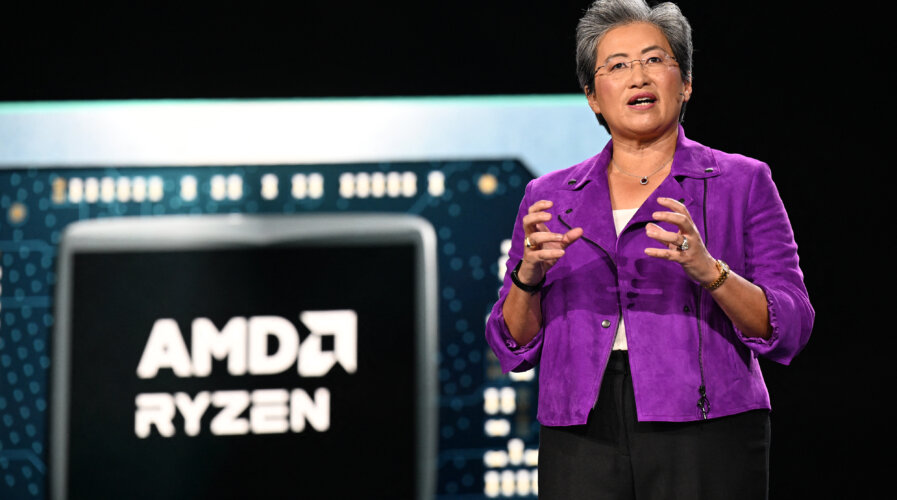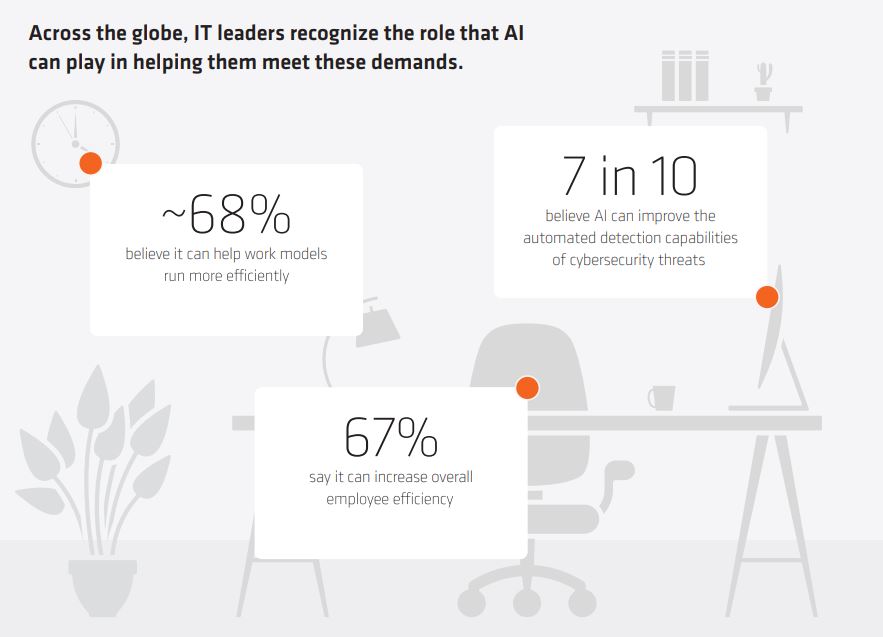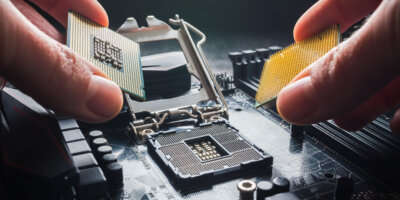
AMD Chair and CEO Lisa Su speaks at the AMD Keynote address during the Consumer Electronics Show (CES) on January 4, 2023 in Las Vegas, Nevada. Since then, AMD has continued to invest in AI to meet business demands. (Photo by Robyn BECK / AFP)
AMD: AI is transforming businesses, and companies are ramping up investments
- AMD leads in AI with high-performance chips and a focus on diversity, while Intel lags.
- While Nvidia rules the AI game right now, AMD has developments in store that could see it overtake the leader.
- AMD is shaping AI enterprise computing with its cutting-edge processors and commitment to workplace diversity.
Over the past six months, the field of artificial intelligence (AI) has seen astonishing progress. Advanced generative AI tools have rapidly become a topic of mainstream conversation. As a result, many organizations are reevaluating their strategies for digital transformation, which brings both novel challenges and opportunities. A focus on AI investments is becoming an integral part of these evolving strategies.
For IT leaders, the rapid advancements in AI technology present both complications and potential gains. A recent survey by AMD highlighted that 75% of global IT leaders are hopeful about the positive impact of AI—from streamlining workforce tasks to fortifying cybersecurity. Additionally, over two-thirds of these leaders are ramping up their investments in AI capabilities.
The uncertainties in AI adoption: What’s holding back investments?
Implementing generative AI though is not an walk in the park for many companies. The path toward AI adoption is fraught with uncertainties, mainly driven by three key concerns:
- While there’s general enthusiasm about AI’s potential for enhancing security measures, 67% of IT leaders are apprehensive that it could introduce novel security and governance risks.
- 52% believe their current IT setups are inadequate for managing the computational demands of AI.
- The effort and resources required to educate the workforce about AI are substantial, although the exact requirements are unclear, and will change from organization to organization.
Despite these reservations, particularly around security and training needs, it’s evident that early adopters of AI are reaping significant benefits—a staggering 90% of organizations that have prioritized AI report noticeable improvements in workplace efficiency.
Matthew Unangst, AMD’s Senior Director for Commercial Client and Workstation, emphasizes the advantage of being a trailblazer in AI adoption. Although enterprises are beginning to recognize the value of AI, a comprehensive implementation strategy is essential to prevent falling behind the curve.
“Open software ecosystems, with high-performance hardware, are essential, and AMD believes in a multi-faceted approach of leveraging AI IP across our full portfolio of products to the benefit of our partners and customers,” said Unangst.

There’s growing recognition among IT leaders of the potential offered by AI-enabled technologies—and they
are ramping up investments accordingly. (Image – AMD)
Semiconductors and AI
2023 has proven to be a favorable year for semiconductor firms, mainly due to the expanding role of AI. This growth has been a game-changer for many chip manufacturers previously struggling with sluggish PC, smartphone, and consumer electronics sales.
Semiconductors are indispensable in training extensive AI models and executing inferencing tasks. They allow for the practical application of trained models, enabling them to make predictions based on fresh data inputs.
As the global urgency to combat climate change intensifies, semiconductors are becoming critical in facilitating essential research and developing more energy-efficient systems. AMD is actively pursuing a 30x improvement in energy efficiency in their processors and accelerators slated for AI and High-Performance Computing (HPC) by 2025. For 2023, the company is well on its way to achieving a 13.5x efficiency boost from its 2020 baseline.
To equip IT leaders with top-tier computing platforms for AI implementations, AMD is committed to innovating across its entire product lineup—from cloud solutions to edge computing and end-user devices. It is also fostering collaborations with open, industry-standard software platforms.
AMD rolled out its inaugural AMD Ryzen 7040 Series processors earlier this year. Selected models feature a Ryzen AI Engine that supports Windows Studio Effects and Ryzen AI developer tools, creating unique user experiences and opening up new possibilities for AI functionalities directly within laptops.

AMD Ryzen AI technology presented – as more businesses set to make AI investments. (Source – YouTube)
By offering a dedicated AI engine for mobile computing, several advantages emerge:
- Personalized and secure employee experiences through local AI model execution.
- Improved power efficiency, leading to heightened productivity and connectivity.
- Enhanced organizational capacity to manage AI workloads, thanks to enabling next-gen software on laptops.
Modernizing on-premise data centers is also a priority. By adopting the latest AMD EPYC processors, businesses can drastically reduce their infrastructure requirements by up to 70%.

A Tweet by AMD CEO on some of their big chip announcements in June.
The competitive landscape: Who’s who in semiconductor chips?
Regarding the fiercely competitive landscape of semiconductor manufacturers, AMD, Nvidia, and Intel are key players. In a head-to-head comparison between Nvidia and AMD, the latter has experienced relatively sluggish growth and lower revenue returns. For example, AMD’s MI250 chip performs at about 80% of the speed of Nvidia’s A100 chip.
Yet it’s important to note that AMD recently disclosed specifics about its forthcoming AMD Instinct MI300X accelerator, which it touts as the pinnacle of generative AI technology. This accelerator promises to deliver the computational and memory efficiencies essential for training and utilizing expansive language models.
To round off its offering, AMD is also launching a robust, open-source AI software environment via its AMD ROCm ecosystem, specifically tailored for data center acceleration.
On the other side of the equation, Intel’s performance has been lackluster, evidenced by consecutive years of declining revenue and a near-absent footprint in the AI chip market. Although traditionally a dominant force in CPU production, Intel’s venture into AI has been riddled with challenges. For instance, its Sapphire Rapids processor has been plagued by years-long delays, mainly due to intricate design complexities and multiple technical snags.
Looking to the future, all three tech giants have signaled an intention to expand their portfolios of AI products. This ambition is easily understood, given that platforms like ChatGPT reportedly operate on an infrastructure of 10,000 Nvidia A100 chips, a setup that would command an estimated total cost of about US$100 million.
Beyond AMD’s emphasis on AI technologies, the company is deeply committed to fostering diversity within its ranks, and enhancing gender representation in engineering roles. AMD takes pride in a high retention rate for female engineers and is cultivating an inclusive work environment.
An overwhelming 92% of AMD’s worldwide staff attest to the company’s success in creating an atmosphere where diversity is celebrated. Complementing this, AMD continues to channel investments into STEM education, partnering with schools and non-profit organizations to further this mission.
On June 13th, 2023, AMD announced the products, strategy and ecosystem partners that will shape the future of computing, highlighting the next phase of data center innovation.
READ MORE
- 3 Steps to Successfully Automate Copilot for Microsoft 365 Implementation
- Trustworthy AI – the Promise of Enterprise-Friendly Generative Machine Learning with Dell and NVIDIA
- Strategies for Democratizing GenAI
- The criticality of endpoint management in cybersecurity and operations
- Ethical AI: The renewed importance of safeguarding data and customer privacy in Generative AI applications






